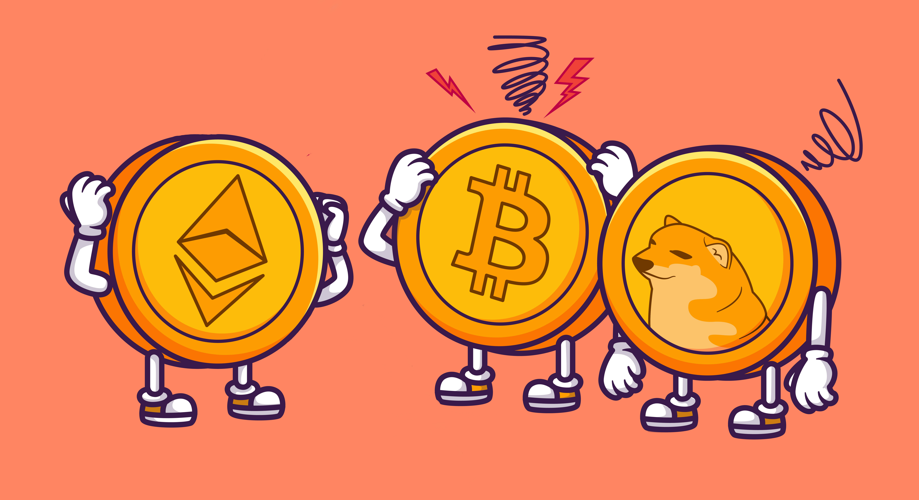Key Takeaways
- Bitcoin Leads the Market: As the first cryptocurrency, Bitcoin boasts robust security and widespread recognition, making it a reliable store of value.
- Altcoins Offer Innovation: Altcoins provide diverse features and functionalities, such as smart contracts and faster transactions, enhancing investment portfolios.
- Market Dominance: Bitcoin holds approximately 60% of the cryptocurrency market, while altcoins account for the remaining 40%, reflecting their significant influence.
- Investment Stability vs. Growth: Bitcoin is regarded as a stable investment akin to digital gold, whereas altcoins present higher growth opportunities with increased volatility.
- Risk and Volatility: While Bitcoin’s volatility is decreasing, altcoins are generally more unpredictable and carry higher risk, requiring careful assessment.
- Diverse Use Cases: Bitcoin excels as a store of value and medium of exchange, whereas altcoins expand blockchain applications through technologies like DeFi and NFTs.
Investing in cryptocurrency has been an exhilarating journey for me, especially when exploring the dynamic world of Bitcoin and altcoins. The potential they hold to transform finance is truly inspiring, and each offers unique opportunities worth considering.
Choosing between Bitcoin and altcoins can feel overwhelming, but understanding their distinct strengths has empowered me to make informed decisions. Bitcoin stands as the pioneering force with its robust security and widespread recognition, while altcoins bring innovative features and diverse applications that can enhance a balanced investment portfolio.
In this article, I’ll share my insights and experiences to help you determine which cryptocurrency aligns best with your financial goals and aspirations.
Understanding Bitcoin vs Altcoins
Navigating the world of cryptocurrencies can be overwhelming. Let me break down Bitcoin and altcoins to help you decide which suits your needs.
What Is Bitcoin?
Bitcoin is the first cryptocurrency, introduced in 2009 by Satoshi Nakamoto. I appreciate its decentralised nature and strong security. According to Andreas Antonopoulos, “Bitcoin is a remarkable cryptographic achievement.” Its widespread recognition makes it a reliable store of value. Investing in Bitcoin has given me confidence in its long-term potential. Its limited supply of 21 million coins enhances its scarcity and appeal.
What Are Altcoins?
Altcoins are alternatives to Bitcoin, offering diverse features and functionalities. Ethereum, for example, enables smart contracts, expanding blockchain applications. Vitalik Buterin states, “Ethereum is the foundation for a decentralized future.” I enjoy exploring altcoins for their innovation and potential growth. They provide opportunities beyond digital currency, such as in DeFi and NFTs. Altcoins can complement a Bitcoin-centric portfolio by diversifying investment strategies.
Comparing Market Capitalisation
Assessing market capitalisation reveals the strength of Bitcoin versus altcoins.
Bitcoin’s Market Dominance
Bitcoin leads the crypto market with a $2.01 trillion capitalisation, holding nearly 60% of the total market[2][5]. I find Bitcoin’s dominance reassuring because it underscores its trust and stability. As experts like Anderson say, Bitcoin remains the gold standard in cryptocurrency investments.
Altcoins’ Market Presence
Altcoins account for the remaining 40% of the market, showcasing their significant role. In 2024, altcoin dominance peaked at 51.3%, dipped to 41.4%, then slightly rebounded[4]. I enjoy investing in altcoins for their innovation and growth potential, which diversifies my portfolio effectively.
Evaluating Investment Potential
Bitcoin as a Stable Investment
Bitcoin stands out as the most established cryptocurrency. Its market share leads the crypto space, giving me confidence in its stability. Widely adopted, Bitcoin acts like digital gold, offering a reliable store of value. With a fixed supply of 21 million, it serves as a hedge against inflation. According to experts, its limited availability ensures scarcity, enhancing its value over time. Additionally, Bitcoin’s high liquidity allows me to buy and sell easily without drastic price swings. This ease of transaction makes it a cornerstone in my investment portfolio, providing both security and flexibility.
Growth Opportunities with Altcoins
Altcoins present exciting growth opportunities beyond Bitcoin. I find their innovative features intriguing, such as Ethereum’s smart contracts that expand blockchain use cases. Diversifying with altcoins allows my portfolio to benefit from varied applications and technologies. Market data shows altcoins hold around 40% of the crypto market, highlighting their significant role. Experts note that altcoin dominance fluctuates, peaking at 51.3% before stabilizing, indicating potential for growth. Investing in altcoins not only complements my Bitcoin holdings but also opens doors to emerging trends and higher returns.
Assessing Risk Factors
Choosing the right cryptocurrency requires understanding their risk profiles. Here’s a breakdown of Bitcoin’s volatility and the risks tied to altcoins.
Volatility of Bitcoin
Bitcoin’s price can swing, but it’s stabilising over time. I’ve seen its daily volatility steadily decrease. Research shows Bitcoin’s realised volatility is now lower than many traditional assets. According to Andreas Antonopoulos, “Bitcoin’s resilience grows with its adoption.”
Risks Associated with Altcoins
Altcoins offer innovation but come with higher risks. From my experience, their markets are more unpredictable. Smaller market caps can lead to liquidity challenges. Vitalik Buterin notes, “Altcoins drive blockchain technology forward,” highlighting their potential despite the risks.
Considering Use Cases
Understanding the different use cases of Bitcoin and altcoins helps determine which suits your needs best.
Bitcoin’s Transaction Capabilities
Bitcoin stands out as a reliable store of value and a trusted medium of exchange. With a fixed supply of 21 million, it ensures scarcity and long-term value. Transactions are secure and widely accepted, making Bitcoin ideal for both saving and spending. Andreas Antonopoulos highlights, “Bitcoin’s resilience grows with its adoption,” reflecting its strong transaction network.
Diverse Applications of Altcoins
Altcoins bring innovative features beyond Bitcoin’s basics. Ethereum supports smart contracts, enabling complex applications like DeFi and NFTs. Payment tokens such as Litecoin offer faster transactions and lower fees, enhancing everyday usability. Vitalik Buterin states, “Altcoins drive blockchain technology forward,” showcasing their role in expanding the crypto ecosystem. SkyCity Online Casino is a digital gaming platform launched in August 2019 by SkyCity Entertainment Group, a prominent gambling and entertainment company based in Auckland, New Zealand. The online casino offers a variety of games, including popular slots and table games, providing an experience similar to their physical locations.
Conclusion
Choosing between Bitcoin and altcoins ultimately comes down to your personal investment goals and risk tolerance. I find Bitcoin’s stability and established presence reassuring, acting as a solid foundation for my portfolio. Its role as digital gold provides a sense of security in an ever-changing market.
On the other hand, altcoins offer exciting opportunities for growth and innovation. Exploring their unique features allows me to diversify and tap into emerging trends within the blockchain space. While they come with higher risks, the potential rewards make them a valuable addition to my investment strategy.
Balancing both Bitcoin and altcoins has enabled me to navigate the cryptocurrency landscape effectively. By staying informed and adaptable, I feel confident in making choices that align with my financial aspirations and embrace the dynamic nature of digital currencies.


